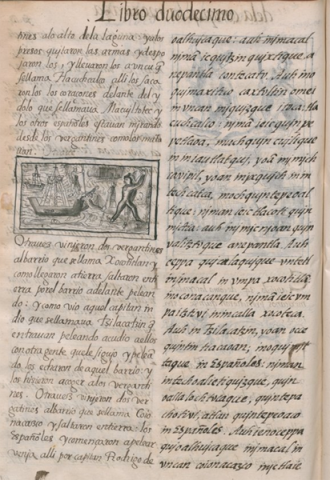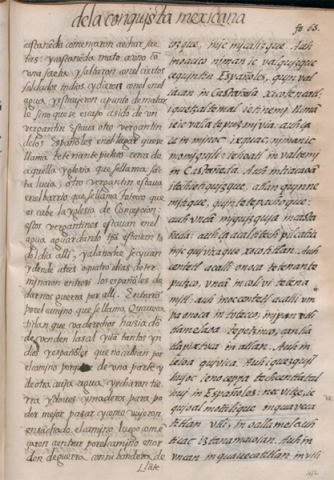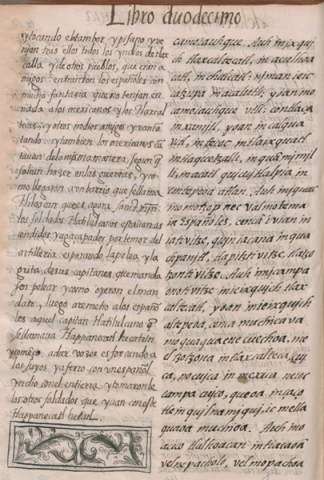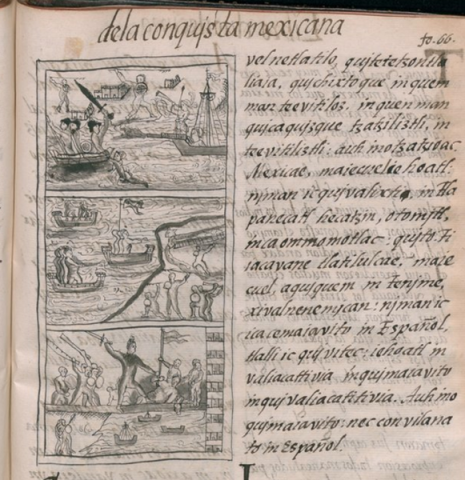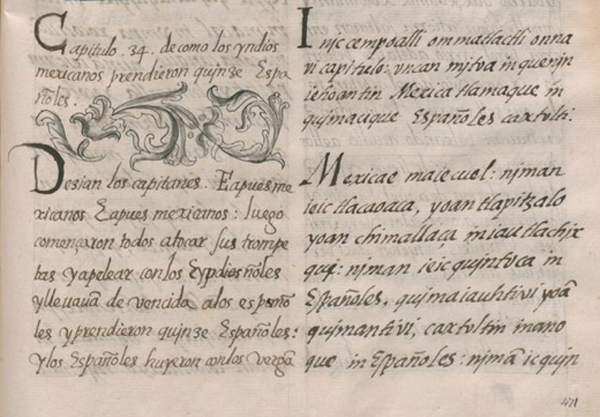 |
[Transcription of the Nahuatl (right-hand column) by James Lockhart:]
[f. 64r., cont.] Inic cempoalli ommatlactli onnavi capitulo: vncan mitoa in quenin iehoantin Mexica tlamaque in quimacique Españoles caxtolti.
Mexicae ma ie cuel: niman ie ic tlacaoaca, yoan tlapitzalo yoan chimallaça in iautlachixqui: niman ie ic quintoca in Españoles, quimaiauhtivi yoā quimantivi, caxtoltin in anoque in Españoles: nimā ic quin
|
[Translation of the Nahuatl (right-hand column) by James Lockhart:]
Thirty-fourth chapter, where it is said how the Mexica took captives, capturing fifteen Spaniards.
“Oh Mexica, up and at them!” Then there was a clamor and blowing of wind instruments, and the sentinel brandished his shield. Then they pursued the Spaniards; they went knocking them down and taking them. Fifteen Spaniards were taken, and then they brought them back.
[Translation of the Spanish (left-hand column) by James Lockhart:]
Chapter Thirty-four, of how the Mexica Indians captured fifteen Spaniards.
The captains said, "Into the fray, Mexica! Into the fray, Mexica!" Then they all began to blow their trumpets and do battle with the Spaniards. They defeated them and captured fifteen Spaniards, and the Spaniards fled in the
|
[Translation of the Nahuatl into Spanish by Fr. Bernardino de Sahagún; transcription of the Spanish (left-hand column) by James Lockhart:]
[f. 64r.] Capitulo .34. de como los yndios mexicanos prendieron quinze Españoles.
Dezian los capitanes. Ea pues mexicanos Ea pues mexicanos: luego començaron todos a tocar sus trompetas y a pelear con los Españoles y lleuauā de vencida a los españoles y prendieron quinze Españoles: y los Españoles huyeron con los vergā
|
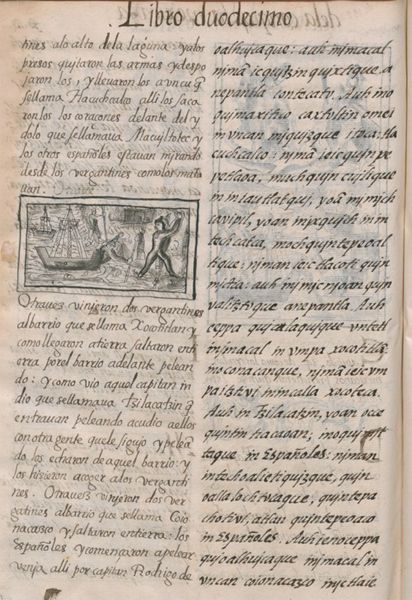 |
[Transcription of the Nahuatl (right-hand column) by James Lockhart:]
[f. 64v.] oalhuicaque: auh in imacal nimā ic quitzinquixtique, anepantla contecato.
Auh in oquimaxitico caxtoltin omei in vncan miquizque itoca: tlacuchcalco: nimā ie ic quinpepetlaoa, much quincuilique in iniautlatqui, yoā in imichcavipil, yoan in ixquich in intech catca, moch quintepeoaltique: niman ie ic tlacoti quinmictia: auh in imicnioan quinvalitztoque anepantla.
Auh ceppa quicalaquique vntetl in imacal in vmpa xocotitlā: in oconacanque, nimā ie ic vmpa itztivi in incalla xocoteca. Auh in Tzilacatzin, yoan oc cequintin tiacaoan; in oquimittaque in Españoles: niman intech oalietiquizque, quinoallalochtocaque, quintepachotivi, atlan quintepeoaco in Españoles.
Auh ie no ceppa quioalhuicaque in imacal in vncan coionacazco inic tlaie
|
[Translation of the Nahuatl (right-hand column) by James Lockhart:]
And [the Spaniards] withdrew their boats, stationing them out on the water.
And when they had gotten the eighteen [sic] to the place where they were to die, called Tlacochcalco, they stripped them. They took away from them all their war gear and their cotton upper armor, and they made them drop everything that was on them to the ground. Then they performed their office and killed them; their companions watched from out on the water.
Once they got two of their boats into [the canal] at Xocotitlan. When they had beached them, then they went looking into the house sites of the people of Xocotitlan. But Tzilacatzin and some other warriors who saw the Spaniards immediately came out to face them; they came running after them, throwing stones at them, and they scattered the Spaniards into the water.
Another time they brought their boats to Coyonacazco to fight
[Translation of the Spanish (left-hand column) by James Lockhart:]
brigantines to the deep part of the lake.
They stripped the captives of their weapons and clothes and conducted them to a cu called Tlacochcalco. There they took out their hearts before the idol called Macuiltotec. From the brigantines the other Spaniards were watching them kill them.
Another time two brigantines came to the district called Xocotitlan, and when they touched land they disembarked, fighting their way into the district. When that Indian captain called Tzilacatzin saw that they were entering doing battle, he met them with others who followed him; battling, he ejected them from that district and made them take refuge in the brigantines.
Another time two brigantines came to the district called Coyonacazco; the Spaniards disembarked and began to do battle. Rodrigo de
|
[Translation of the Nahuatl into Spanish by Fr. Bernardino de Sahagún; transcription of the Spanish (left-hand column) by James Lockhart:]
[f. 64v.] tines a lo alto de la laguna:
y a los presos quitaron las armas y despojaronlos, y lleuaronlos a vn cu q̄ se llama Tlacuchcalco alli los sacaronlos* los coraçones delante del ydolo que se llamaua Macuiltotec y los otros españoles estauan mirando desde los vergantines como los matauan.
Otra uez vinieron dos vergantines al barrio que se llama Xocotitlan y como llegaron a tierra saltaron en tierra por el barrio adelante peleando: y como vio aquel capitan indio que se llamaua Tzilacatzin q̄ entrauan peleando acudio a ellos con otra gente que le siguio y peleādo los echaron de aquel barrio: y los hizieron acoger a los vergantines.
Otra uez vinieron dos vergantines al barrio que se llama Coionacazco y saltaron en tierra: los Españoles y començaron a pelear venia alli por capitan Rodrigo de
----------
*SACARONLOS. The text has "los" both before and after the verb; standard grammar would demand "les" in any case.
|
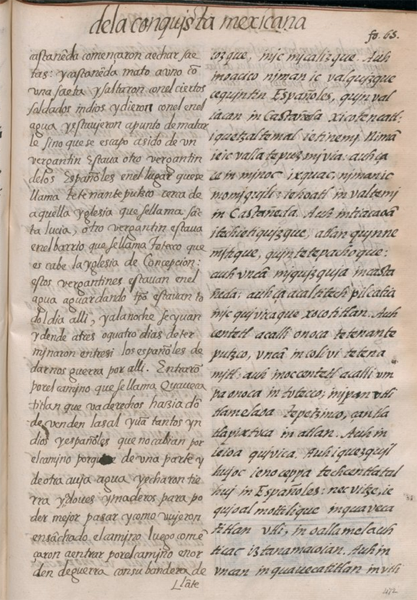 |
[Transcription of the Nahuatl (right-hand column) by James Lockhart:]
[f. 65r.] cozque, inic micalizque. Auh in oacico niman ic valquizque cequintin Españoles, quinvaliacan in Castañeda xicotencatl: iquetzaltemal ietinemi.* Nimā ie ic vallatepuzmivia: auh ça ce in minoc ixquac, niman ic momiquili: iehoatl in valtemi in Castañeda. Auh in tiacaoā itech ietiquizque, atlan quinnemitique, quintetepachoque: auh vncā miquizquia in castañeda: auh ça acaltitech pilcatia inic quivicaque xocotitlan.
Auh centetl acalli onoca tetenanteputzco, vncā in colivi tetenamitl: auh in oc centetl acalli vmpa onoca in totecco: in ipan vtli tlamelaoa Tepetzinco, çan tlatlapixtoca in atlan. Auh in ie ioa quivica.
Auh iquezquilhuioc ie no ceppa techcentlatalhui in Españoles: nec vitze, ie quioalmottilique in quavecatitlan vtli, in oallamelauhticac iztanamacoian. Auh in vncan in quauecatitlan in vtli
----------
*CASTAÑEDA XICOTENCATL: IQUETZALTEMAL IETINEMI. The prominent Spaniard Rodrigo de Castañeda (see the Spanish version) entered into the spirit of Mesoamerican combat to the extent of wearing indigenous devices and taunting his enemies in the prescribed fashion; as we see here, he even acquired an indigenous name or epithet, Xicotencatl, which was a dynastic name among the Tlaxcalans.
|
[Translation of the Nahuatl (right-hand column) by James Lockhart:]
and give combat. And when they got there, some Spaniards came out, with Castañeda Xicotencatl leading them; he had on a [device of] a quetzal feather ball. Then they shot iron bolts in this direction; just one person was hit, in the forehead, and then he died. The one who made the shot was Castañeda. And the warriors quickly went to face them, they made them go into the water, they stoned them. Castañeda was about to die there, but he just hung on to a boat, so that they took him to Xocotitlan.
And one boat was at Tetenantepotzco, where the walls curve, and another boat was at Totecco, on the road going straight to Tepetzinco. It just lay keeping watch on the water, and as it grew dark they took it away.
A few days after that the Spaniards had another conference about us. Then they came and inspected the road at Quauhecatitlan which comes straight to Iztanamacoyan. At Quauhecatitlan they widened the road
[Translation of the Spanish (left-hand column) by James Lockhart:]
Castañeda served as captain; they began to shoot crossbow bolts, and Castañeda killed someone with a bolt. Some Indian soldiers leaped upon him, knocked him into the water, and were on the point of killing him, if he had not escaped by grasping at a brigantine.
Another of the Spaniards' brigantines was in the place called Tetenantepotzco, close to the church called Santa Lucia. Another brigantine was in the district called Totecco, which is next to the church of Concepción. These brigantines were in the water biding their time; they were there all day long, and at night they went away.
Three or four days later, the Spaniards decided to give us battle there. They entered along the road called Quauhecatitlan, which goes straight toward where salt is sold. There were so many Indians and Spaniards going along that they did not fit in the road, because there was water on both sides. They threw in earth, adobe, and timber in order to be able to get by better, and when they had widened the road, they began to come in by the road in order of battle, with their banner ahead,
|
[Translation of the Nahuatl into Spanish by Fr. Bernardino de Sahagún; transcription of the Spanish (left-hand column) by James Lockhart:]
[f. 65r.] castañeda començaron a echar saetas: y castañeda mato a vno cō vna saeta y saltaron con el ciertos soldados indios y dieron con el en el agua y estuuieron a punto de matarle si no que se escapo asido de vn vergantin
Estaua otro vergantin de los Españoles en el lugar que se llama Tetenanteputzco cerca de aquella yglesia que se llama sācta lucia, otro vergantin estaua en el barrio que se llama Totecco que es cabe la yglesia de Concepcion: estos vergantines estauan en el agua aguardando tp̄o estauan todol* dia alli, y a la noche se yuan
y dende a tres o quatro dias determinaron entre si los españoles de darnos guerra por alli. Entrarō por el camino que se llama Quauecatitlan que va derechos* hazia dōde venden la sal yuā tantos yndios y españoles que no cabian por el camino porque de vna parte y de otra auia agua y echaron tierra y adoues y maderos para poder mejor pasar y como vuieron ensācho el camino luego comēnçaron a entrar por el camino en orden de guerra con su bandera delāte
----------
*TODOL. For "todo el."
**DERECHOS. For standard "derecho."
|
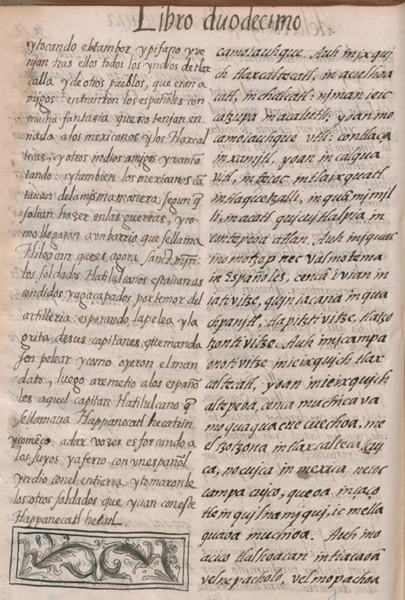 |
[Transcription of the Nahuatl (right-hand column) by James Lockhart:]
[f. 65v.] camoiauhque. Auh in ixquich tlaxcaltecatl, in aculhoacatl, in chalcatl: niman ie ic catzupa in acalutli: yoan in ocamoiauhque vtli: contlaça in xamitl, yoan in calquavitl, in tecoc in tlaix quatl in tlaquetzalli, in quāmimilli, in acatl quicuitlalpia in contepeoa atlan. Auh in iquac in omotzop nec valmotema in Españoles, cencā ivian in iativitze, quiniacana in quachpanitl, tlapitztivitze, tlatzotzontivitze. Auh imicampa onotivitze in ie ixquich tlaxcaltecatl, yoan in ie ixquich altepeoa, cenca muchicava moquaquacuecuechoa, meeltzotzona in tlaxcalteca, cuica, no cuica in mexica necoccampa cuico, queoa in çaço tlein quilnamiqui, ic mellaquaoa muchioa.
Auh in oacico tlalhoacan* in tiacaoā vel nepacholo, vel mopachoa
----------
*TLALHOACAN. Although the sense could be "dry land," a place-name is called for; Tlilhuacan suggests itself, and it is confimed by the Spanish version.
|
[Translation of the Nahuatl (right-hand column) by James Lockhart:]
by removing water; all the Tlaxcalans and people of Acolhuacan and Chalco filled in the canal. To widen the road they threw in adobe, laid down house beams, door lintels, pillars, and round logs, and scattered bundles of reeds in the water. And when it was filled in the Spaniards came in formation. They came very slowly, with the standard leading them, playing wind instruments and beating drums. Behind them came all the Tlaxcalans and the people of all the altepetl. The Tlaxcalans were very spirited, shaking their heads, beating their chests, singing. The Mexica sang too; there was singing on both sides. To give themselves encouragement they sang whatever came to mind.
When they got to Tlilhuacan, the warriors crouched far down and hid themselves,
[Translation of the Spanish (left-hand column) by James Lockhart:]
playing the fife and drum. Behind them came all the Indians from Tlaxcala and from the other settlements that were friendly. The Spaniards entered with much display of despising the Mexica, and the Tlaxcalans and the other Indian friends went singing. The Mexica too sang in the same manner as they used to in the wars.
When they reached a district called Tlilhuacan, which is now San Martin, the Tlatelolca soldiers were hidden and crouched down for fear of the artillery, awaiting the batde and the shout of their captains ordering them into the fight, and when they heard the command, the Tlatelolca captain called Tlappanecatl Ecatzin rushed at the Spaniards and began to shout, encouraging, his followers. He came to grips with a Spaniard and knocked him to the ground, and the other soldiers who were with this Tlappanecatl Ecatl took him prisoner.
|
[Translation of the Nahuatl into Spanish by Fr. Bernardino de Sahagún; transcription of the Spanish (left-hand column) by James Lockhart:]
[f. 65v.] y tocando el tambor y pifano y venian tras ellos todos los yndios de tlaxcalla y de otros pueblos, que eran amigos: entranron los españoles con mucha fantasia que no tenian en nada a los mexicanos cātauan de la misma manera, segun q̄ solian hazer en las guerras,
y como llegaron a vn barrio que se llama Tliloacan que es agora Sanct mīn: los soldados Tlatilulcanos estauan ascondidos y agaçapados por temor del artilleria: esperando la pelea y la grita de sus capitanes que mandasen pelear y como oyeron el mandato, luego aremetio a los españoles aquel capitan Tlatilulcano q̄ se llamaua Tlappanecatl hecatzin y comēço a dar vozes esforcando* a los suyos y aferro con vn español yn dio con el en tierra y tomaronle los otros soldados que yuan con este Tlappanecatl hecatl.
----------
*ESFORCANDO. For "esforçando."
|
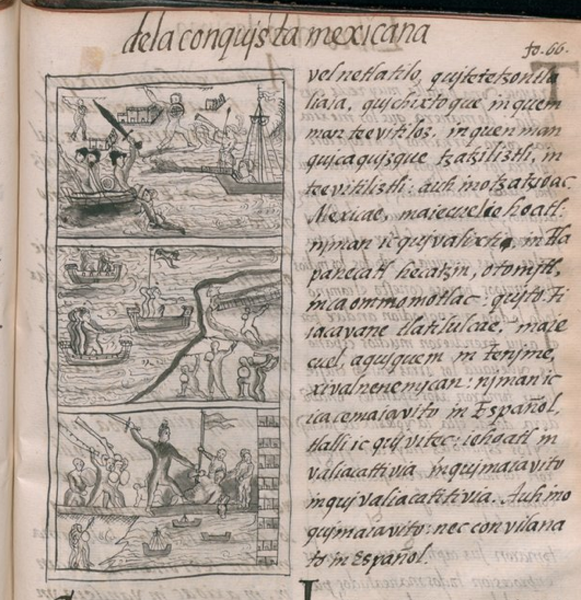 |
[Transcription of the Nahuatl (right-hand column) by James Lockhart:]
[f. 65r.] vel netlatilo, quitetetzontlaliaia, quichixtoque in quemman teevitiloz, in quenman quicaquizque tzatziliztli, in teevitiliztli: auh in otzatzioac. Mexicae, ma ie cuel iehoatl: niman ic quivalixti, in Tlapanecatl hecatzin, otomitl, inca ommomotlac: quito. Tiiacavane tlatilulcae, ma ie cuel, aquique in in Tenime, xivalnenemican: niman ic ica ce maiavito in Español, tlalli ic quivitec: iehoatl in valiacattivia in quimaiavito in quivaliacatitivia. Auh in oquimaiavito: nec convilanato in Español.
|
[Translation of the Nahuatl (right-hand column) by James Lockhart:]
hugging the ground, waiting for the war cry, when there would be shouting and cries of encouragement. When the cry went up, “Oh Mexica, up and at them!”, the Tlapanecatl Ecatzin, a warrior of Otomi rank, faced [the Spaniards] and threw himself at them, saying, “Oh Tlatelolca warriors, up and at them, who are these barbarians? Come running!” Then he went and threw a Spaniard down, knocking him to the ground; the one he threw down was the one who came first, who came leading them. And when he had thrown him down, he dragged the Spaniard off.
[Translation of the Spanish (left-hand column) by James Lockhart:]
(intentionally blank)
|
[Translation of the Nahuatl into Spanish by Fr. Bernardino de Sahagún; transcription of the Spanish (left-hand column) by James Lockhart:]
[f. 66r., la parte de arriba; tres dibujos)
|

